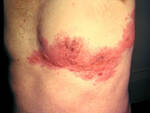MedicalResearch.com Interview with:|
Sharon G. Curhan, MD, ScM|
Director, CHEARS: The Conservation of Hearing Study
Channing Division of Network Medicine
Department of Medicine
Brigham and Women’s Hospital
Harvard Medical School
Boston, MA 02114
MedicalResearch.com: What is the background for this study?
Response: Herpes zoster, commonly known as “shingles,” is a viral infection that often causes a painful rash. Shingles can occur anywhere on the head or body. Shingles is caused by the varicella zoster virus (VZV), the same virus that causes chickenpox. After a person has chickenpox, the virus stays in their body for the rest of their life. Years and even decades later, the virus may reactivate as shingles. Almost all individuals age 50 years and older in the US have been infected with the varicella zoster virus and therefore they are at risk for shingles.
About 1 in 3 people will develop shingles during their lifetime, and since age is a risk factor for shingles, this number may increase as the population ages. The risk is also higher among individuals of any age who are immunocompromised due to disease or treatment. A number of serious complications can occur when a person develops shingles, such as post-herpetic neuralgia (long-lasting pain), but there was limited information on whether there are other adverse long-term health implications of developing shingles.
There is a growing body of evidence that links VZV, the virus that causes shingles, to vascular disease. VZV vasculopathy may cause damage to blood vessels and increase the risk of stroke or coronary heart disease. Although some previous studies showed a higher risk of stroke or heart attack around the time of the shingles infection, it was not known whether this higher risk persisted in the long term. Therefore, the question we aimed to address in this study was to investigate whether shingles is associated with higher long-term risk of stroke or coronary heart disease.
To address this question, we conducted a prospective longitudinal study in 3 large US cohorts of >200,000 women and men, the Nurses’ Health Study (>79,000 women), the Nurses’ Health Study II (almost 94,000 women) and the Health Professionals Follow-Up Study (>31,000 men), without a prior history of stroke or coronary heart disease. We collected information on shingles, stroke and coronary heart disease on biennial questionnaires and confirmed the diagnoses with medical record review. We followed the participants for up to 16 years and evaluated whether those who had developed shingles were at higher risk for stroke or coronary heart disease years after the shingles episode. The outcomes we measured were incident stroke, incident coronary heart disease [defined as having a non-fatal or fatal myocardial infarction (heart attack) or a coronary revascularization procedure (CABG, coronary artery bypass graft or percutaneous transluminal coronary angioplasty)]. We also evaluated a combined outcome of cardiovascular disease, which included either stroke or coronary heart disease, whichever came first.
(more…)
 Response: Despite significant improvements in the drug-eluting stents that are used to treat patients with coronary artery disease, 10% of the percutaneous coronary interventions (PCIs) in the U.S. today address in-stent restenosis (ISR), which is when a previously stented section of a coronary artery becomes obstructed or narrowed by plaque or scar tissue. These patients require additional intervention to avoid potential complications. In the multicenter, randomized AGENT IDE trial, we evaluated whether the AGENT™ Drug-Coated Balloon (DCB), a balloon catheter coated with anti-restenotic paclitaxel, is superior to an uncoated balloon in patients for treating ISR. The AGENT DCB is currently available in countries outside the U.S. Our goal is to bring this technology to market in the U.S. and finally provide physicians with an alternative to traditional ISR treatments, such as placing additional layers of stents or radiation, which may not provide ideal outcomes in some cases.
In October 2023, at the Transcatheter Cardiovascular Therapeutics (TCT) 2023 meeting, we presented the primary endpoint data from our AGENT IDE randomized controlled trial evaluating clinical outcomes in patients with ISR undergoing treatment with the AGENT DCB or conventional balloon angioplasty. The positive results in this primary analysis cohort supported the device’s U.S. Food and Drug Administration (FDA) approval, which we announced on March 1, 2024. Just a few months later, data from the full cohort of 600 patients were published in the Journal of the American Medical Association (JAMA) and shared in a late-breaking presentation at Cardiovascular Research Technologies (CRT) 2024 meeting.
(more…)
Response: Despite significant improvements in the drug-eluting stents that are used to treat patients with coronary artery disease, 10% of the percutaneous coronary interventions (PCIs) in the U.S. today address in-stent restenosis (ISR), which is when a previously stented section of a coronary artery becomes obstructed or narrowed by plaque or scar tissue. These patients require additional intervention to avoid potential complications. In the multicenter, randomized AGENT IDE trial, we evaluated whether the AGENT™ Drug-Coated Balloon (DCB), a balloon catheter coated with anti-restenotic paclitaxel, is superior to an uncoated balloon in patients for treating ISR. The AGENT DCB is currently available in countries outside the U.S. Our goal is to bring this technology to market in the U.S. and finally provide physicians with an alternative to traditional ISR treatments, such as placing additional layers of stents or radiation, which may not provide ideal outcomes in some cases.
In October 2023, at the Transcatheter Cardiovascular Therapeutics (TCT) 2023 meeting, we presented the primary endpoint data from our AGENT IDE randomized controlled trial evaluating clinical outcomes in patients with ISR undergoing treatment with the AGENT DCB or conventional balloon angioplasty. The positive results in this primary analysis cohort supported the device’s U.S. Food and Drug Administration (FDA) approval, which we announced on March 1, 2024. Just a few months later, data from the full cohort of 600 patients were published in the Journal of the American Medical Association (JAMA) and shared in a late-breaking presentation at Cardiovascular Research Technologies (CRT) 2024 meeting.
(more…)




























